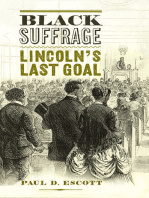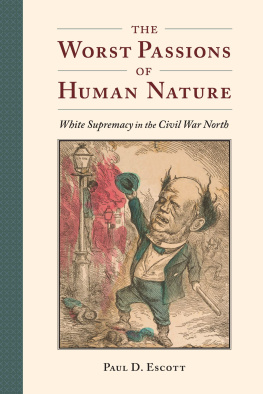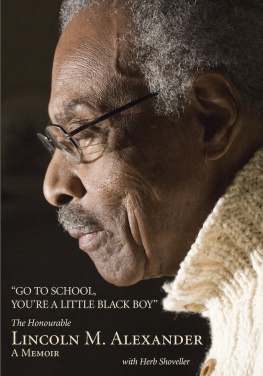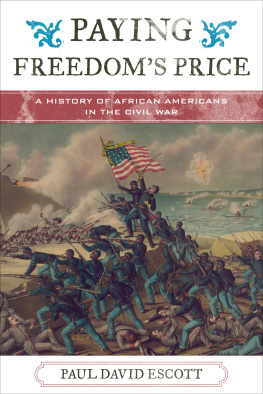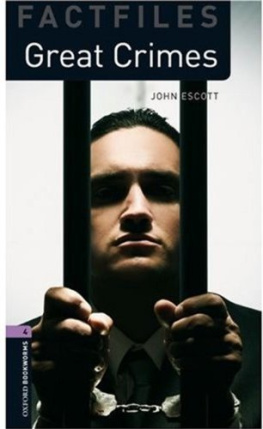Paul D. Escott - Black Suffrage: Lincoln’s Last Goal
Here you can read online Paul D. Escott - Black Suffrage: Lincoln’s Last Goal full text of the book (entire story) in english for free. Download pdf and epub, get meaning, cover and reviews about this ebook. genre: Politics. Description of the work, (preface) as well as reviews are available. Best literature library LitArk.com created for fans of good reading and offers a wide selection of genres:
Romance novel
Science fiction
Adventure
Detective
Science
History
Home and family
Prose
Art
Politics
Computer
Non-fiction
Religion
Business
Children
Humor
Choose a favorite category and find really read worthwhile books. Enjoy immersion in the world of imagination, feel the emotions of the characters or learn something new for yourself, make an fascinating discovery.
- Book:Black Suffrage: Lincoln’s Last Goal
- Author:
- Genre:
- Rating:4 / 5
- Favourites:Add to favourites
- Your mark:
- 80
- 1
- 2
- 3
- 4
- 5
Black Suffrage: Lincoln’s Last Goal: summary, description and annotation
We offer to read an annotation, description, summary or preface (depends on what the author of the book "Black Suffrage: Lincoln’s Last Goal" wrote himself). If you haven't found the necessary information about the book — write in the comments, we will try to find it.
Black Suffrage: Lincoln’s Last Goal — read online for free the complete book (whole text) full work
Below is the text of the book, divided by pages. System saving the place of the last page read, allows you to conveniently read the book "Black Suffrage: Lincoln’s Last Goal" online for free, without having to search again every time where you left off. Put a bookmark, and you can go to the page where you finished reading at any time.
Font size:
Interval:
Bookmark:
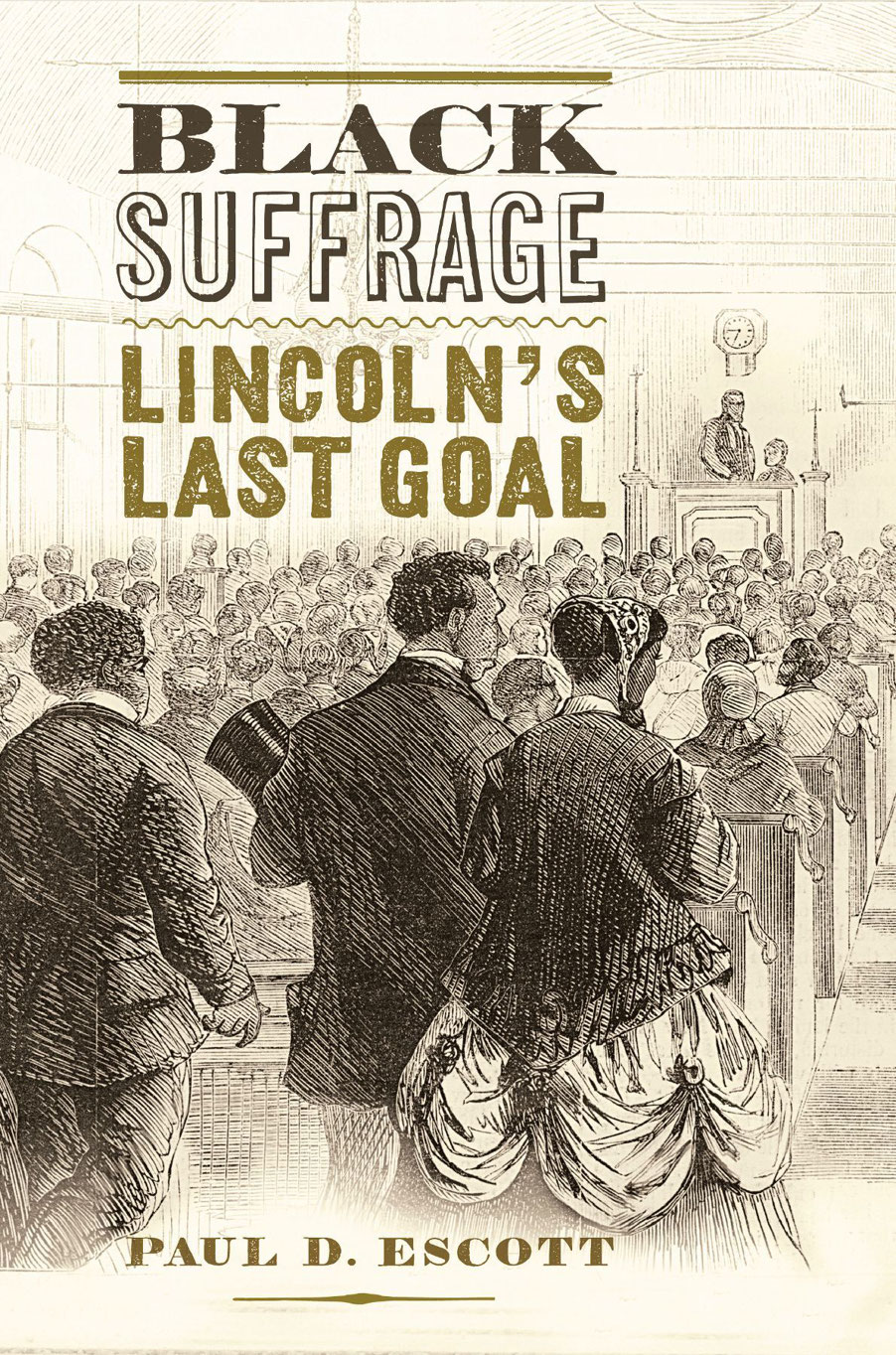
A Nation Divided: Studies in the Civil War Era
Orville Vernon Burton and Elizabeth R. Varon, Editors
Lincolns Last Goal
PAUL D. ESCOTT
University of Virginia Press
Charlottesville and London
University of Virginia Press
2022 by the Rector and Visitors of the University of Virginia
All rights reserved
First published 2022
https://lccn.loc.gov/2021054643
https://lccn.loc.gov/2021054644
Cover art: The National Colored Convention in Session at Washington, D.C. (Sketch by Theodore R. Davis, Harpers Weekly, 6 Feb. 1869; Library of Congress, Prints and Photographs Division, LC-USZ62-100970)
Para Candelas
ms que nunca
This book examines the attitudes toward Black suffrage that surfaced in the North immediately after the end of the Civil War. The victory of the Union Army over Confederate forces meant that the nation would remain united. But the war had not only been about the extension of slave territory or the Souths secession. Beneath these issues lay the question identified by Alexander Stephens of Georgia: the proper status of the negro in our form of civilization. What did Union victory mean for Black rights? Would African Americans gain full liberty, equality under the law, or the right to vote? After the war ended, victorious northerners had to face those questions. Underlying issues of racism and white supremacy became more visible and central than they had been before.
The Civil War was such a significant event in U.S. history that interpretations of it have often been polemical, contrasting, or misleading. Defeated southern whites invented their narrative of a sacred Lost Cause. Northern perspectives on the war changed over time. Fifty years ago respected scholarly interpretations of the period were positive, even celebratory. They emphasized the great advances in human liberty that the United States achieved by ending slavery and preserving the nation. Decades later, as global and domestic affairs changed, citizens perspectives evolved, and historians began to pay more attention to what was not accomplished by the Union victory. At this moment in the twenty-first century, unsolved racial problemsand their roots in the Civil War eraappropriately demand attention. Police killings of unarmed Black men, threats by armed white supremacist groups, and racist comments from the White House all have made clear that the nations racist past is not past. For that reason Americans need to recognize that white supremacy has deeply infected the culture.
More than a decade ago when I turned my research toward the North and Abraham Lincoln, I focused on racism as opposed to emancipation, on stubborn problems as opposed to satisfying achievements. My guiding assumption has been that an accurate knowledge of the roots of contemporary problems is essential to addressing them effectively. Therefore, I analyzed Lincolns record as a great emancipator but not a great egalitarian. For most of his life he promoted colonizationthe removal of African Americans from the nationand his priority as president was not emancipation but preservation of the Union. Many of his policies implied a greater concern for southern whites than for enslaved African Americans. I also investigated important, engrained elements of racism in the Republican Party. Unfortunately, for many in Lincolns party and for many more in the society of his day, racial equality was unthinkable. My most recent book, The Worst Passions of Human Nature: White Supremacy in the Civil War North, explored the imposing breadth and strength of racism and white supremacy in the North during the Civil War. That project took me more deeply into the newspapers, magazines, and partisan propaganda of the war years.
It therefore seemed logical to extend my research into the months of 1865 that followed Abraham Lincolns assassination. Quite a few outstanding works have laid bare the dynamics of Reconstruction policymaking in 1866, 1867, and later, but similarly detailed studies of northern public opinion and attitudes in the last eight or nine months of 1865 are few or lacking. Once I pushed my research into that period, with a focus on Black suffrage, I found that there was much worth noting. Andrew Johnsons policies were not the only influence at work. Racism that flourished in the Democratic Party contended with arguments that the end of the war required a new status for African Americans. The activities of abolitionists, Black leaders, and pro-suffrage Republicans were energetic and prominent, and the events affecting public attitudes had important implications for subsequent years. Accordingly, this book traces and analyzes public discussion and debate on Black suffrage in the North. Because Congress was not in session, the emphasis falls mainly on newspapers, magazines, public celebrations or meetings, public speeches by political figures, and organizing efforts and agitation by abolitionists and Black leaders. The presentation of evidence is both thematic, as suggested in chapter titles, and chronological, as indicated in the early pages of each chapter. The last eight or nine months of 1865 showed both the continuing power of racism and white supremacy in the northern population and the increasing strength of equalitarian ideals within the Republican Party.
A final note: I regret that some readers may be troubled by the evidence of racism in the period as well as by the occasional appearance in quotations of the offensive N-word. Working with the press, I have tried to minimize or avoid its use, but such blatant racism was, unfortunately, deeply characteristic of the time. As citizens, we need to be aware of ugly facts as well as progress in U.S. history. It would be a mistake to sanitize the record so completely as to lose an accurate sense of the past.
I gratefully thank Dr. Jeffrey Crow, my good friend since graduate school, for his advice and comments. I also am indebted to Professor David Goldfield and an anonymous reviewer for the University of Virginia Press for helpful and well-considered comments and suggestions. All errors or omissions are, of course, my own responsibility.
Spring was coming to the nations capital. Flowers began to open, and barren trees sprouted new leaves of lambent green. Spring is usually a hopeful time, but this was especially so in Washington, D.C., in 1865, because there was news of imminent victory. At last, after four years of unprecedented death, destruction, and uncertainty, the Union armies were about to prevail over the rebellious Confederacy.
On April 2 Jefferson Davis and his Cabinet abandoned Richmond. On April 3 northern soldiers took control of the Confederate capital. Abraham Lincoln and his son Tad then walked the citys streets, visiting the rebel White House and the Virginia State Capitol. On April 9 Robert E. Lee surrendered his army to Ulysses S. Grant. This cascade of long-awaited news brought immense gatherings into the streets of the Union capital. During a week of joy and relief, flags were flying from every house and store, and bells were ringing, men laughing, children cheering; all, all [were] jubilant. On April 13 an immense illumination celebrated Lees surrender, as residents lighted candles in every house and every part of the city.
Victory had finally arrived. It was a victory that most northerners had expected to be easy in a war they had assumed would be short. It was a victory coming after dispiriting reverses, painful sacrifices, and enormous changevast and sweeping innovations that neither civilians nor elected leaders had foreseen. Many of the changes would not have happened except that an encompassing wartime emergency had overtaken the North and transformed peoples thinking in many ways. Compelled by events, the Union adapted to emergency conditions by adopting revolutionary measuresconscription, taxation, extraordinary spending, martial law, and, most especially, emancipation. Slavery, an institution much older than the republic and anchored by deep roots that reached far into every aspect of society, at last was to end. Transformative change had been the means to success, the price of victory.
Next pageFont size:
Interval:
Bookmark:
Similar books «Black Suffrage: Lincoln’s Last Goal»
Look at similar books to Black Suffrage: Lincoln’s Last Goal. We have selected literature similar in name and meaning in the hope of providing readers with more options to find new, interesting, not yet read works.
Discussion, reviews of the book Black Suffrage: Lincoln’s Last Goal and just readers' own opinions. Leave your comments, write what you think about the work, its meaning or the main characters. Specify what exactly you liked and what you didn't like, and why you think so.

